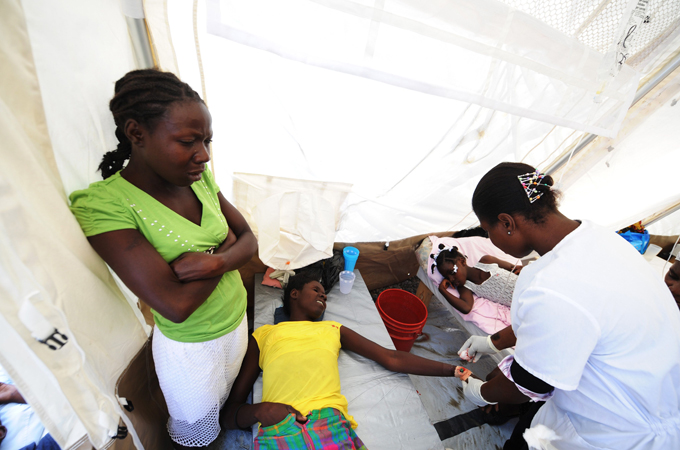Haiti cholera death toll soars
Death toll jumps to 917 as international organisations appeal for funds to fight epidemic.

 |
| As cholera continues to spread, clinics are struggling to cope with the deluge of patients [AFP] |
The death toll from Haiti’s cholera outbreak has soared to 917 as officials struggle to contain the growing epidemic threatening the quake-ravaged country.
As concerns rise over massive health challenges in the aftermath of the country’s cataclysmic earthquake almost a year ago, Haiti confronts the hardening prospect of national elections two weeks from now in the midst of a series of disasters.
Keep reading
list of 4 itemsCould shipping containers be the answer to Ghana’s housing crisis?
Thousands protest against over-tourism in Spain’s Canary Islands
Holding Up the Sky: Saving the Indigenous Yanomami tribe in Brazil’s Amazon
Amid the crises, Haitians are due to vote for a new president and parliamentarians in late November.
Authorities on Sunday said 14,642 people had been treated in hospitals since the disease took hold in the desperately poor Caribbean nation.
Of Haiti’s 10 provinces, six now have been touched by the cholera epidemic according to the health ministry.
Haitian President Rene Preval gave citizens tips on fighting the rapid spread of cholera.
The president led a panel of speakers in a Sunday address to implore citizens to practice good hygiene and proper cooking methods.
Officials fear the scale of the epidemic could increase exponentially if cholera infiltrates makeshift camps in the capital city of Port-au-Prince, where hundreds of thousands of earthquake survivors live in cramped and unsanitary conditions.
A January earthquake flattened much of the capital, leaving more than 250,000 people dead and an estimated 1.3 million of Haiti’s 10 million population displaced.
Public plea
Haitian officials have taken to the airwaves with a major televised campaign to communicate information on the cholera outbreak to the public, but Al Jazeera’s Cath Turner, reporting from Port-au-Prince, said it was not clear how many people were able to watch the special broadcast.
“There were communal television sets, set up at markets, on the sides of the streets, where people gather around and watch,” Turner said. “The first three TV sets that were set up had no electricity, so they didn’t even have any power, which speaks to the conditions here in Haiti at the moment.”
The only working communal set Turner saw was broadcasting a football game.
In addition to having difficulty reaching the public, Turner also reported that officials must also tackle their image problem, as the public views any official statement with “general suspicion and distrust”.
Haiti’s priests and religious leaders, she said, have the most power in terms of reaching people.
“Many Haitians we spoke to say, ‘Maybe Jesus will protect me from this outbreak. If Jesus was meant to give me this cholera, we will face it – we will face this adversity,'” our correspondent said.
Government officials, Turner said, have contacted religious leaders, asking them to talk about cholera in their sermons and services.
UN appeal
International organisations have stepped up appeals for funds to bring in more doctors, medicine and water purification equipment.
The United Nations is asking for $164m to fight the epidemic, which has gained strength over the past week.
“We hope we can get this, otherwise all our efforts will be over-run by the epidemic,” Elisabeth Byrs, a spokeswoman for the UN office for the Coordination of Humanitarian Affairs said in Geneva on Friday.
The outbreak, the first in Haiti in more than a century, was confirmed on October 22 in northern Haiti where the Artibonite River is believed to the conduit of the disease.
Since then, thousands of people have been sickened, swamping tiny, overwhelmed and ill-prepared hospitals and clinics, according to the health ministry.